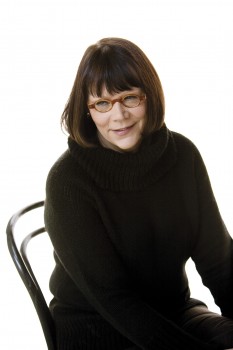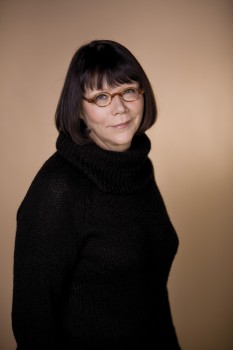Search results for "kristina_carlson"
The anchor
31 March 1990 | Archives online, Fiction, Prose
An extract from the novel Leo (Söderströms, 1989). Introduction by Marianne Bargum
A summer quickly goes by and the beginning of autumn rolls merrily away. The middle of October is the time when things start slackening off, the harvest over, the flax brought in and the time for slaughter approaching. It is growing darker and the storm rumbles over the village, howling even more wildly out there in the darkness where the ships are gradually beginning to struggle home.
In stormy weather, we become touchy and angry. We think about those out there, and are irritated by minor matters people safe on the mainland make such a furore about. We conscientiously go to church the nearer autumn looms, and there we pray ardently for all those in peril on the sea. But then we have the pastor in the pulpit, irritable and angry like the rest of us, and he takes the opportunity to give us a reminder.
‘Out there in the storm the skipper calls on God, but when the storm dies down, he gives thanks for his own skill’, he begins. So you can work out what is to follow. Not very edified, we make our way home in the mud, in the cold wind, a shoulder like a wedge ahead of us. More…
Prose prizes
7 May 2010 | In the news
This year’s Finnish Government Prizes for Literature and Translation have been awarded to, respectively, the writer and journalist (and former Editor-in-Chief of Books from Finland) Kristina Carlson (born 1949) and the translator Tarja Roinila (born 1964). The prizes, which are given on the recommendation of the Finnish National Council for Literature and are worth €15,000 each, were awarded at a ceremony in Helsinki on 4 May by the Minister of Culture and Sports, Stefan Wallin.
Carlson’s second novel, Herra Darwinin puutarhuri (‘Mr Darwin’s gardener’, Otava), published last autumn, is a taut, deep and rich story narrated by many voices, contrasting science and faith, solitude and community. ‘It is not often that a single work renews the novel form,’ remarked the jury. (We featured an interview with Carlson, as well as an extract from the novel here on the Books from Finland website last September.)
The translator Tarja Roinila has specialised in prose and poetry written in Spanish, French and German; her latest translations, of the linguistically complex novels of the Austrian author Thomas Bernhard, are extremely musical, the jury remarked.
On 4 May, which was celebrated in Finland as the Day of the Book and the Rose (this custom, which originally took place on St George’s Day, April 23, was born in Barcelona: originally men gave women roses, and received books in return), Kristina Carlson received the Kiitos kirjasta (‘Thanks for the book’) medal, awarded jointly by the Booksellers’ Association, the bookshop sales asistants’ association Libro and the Finnish Library Association.
A long list of good novels
27 November 2014 | In the news
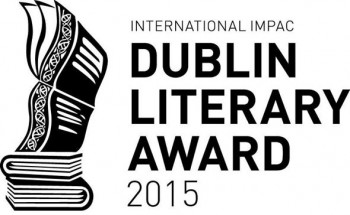 The longlist for the International IMPAC Dublin Literary Award 2015 has been announced and, among the 142 translated novels – from 39 countries and 16 original languages – are two from Finland.
The longlist for the International IMPAC Dublin Literary Award 2015 has been announced and, among the 142 translated novels – from 39 countries and 16 original languages – are two from Finland.
Mr Darwin’s Gardener by Kristina Carlson (Peirene Press, UK, 2012), a novel set in the 1860s England, is translated by Emily and Fleur Jeremiah (see the extracts in Books from Finland).
Cold Courage, a thriller by Pekka Hiltunen (Hesperus Press, UK), is translated by Owen Witesman. Both entries were nominated by Helsinki City Library.
Among the authors writing in English are Margaret Atwood, J.M. Coetzee, Roddy Doyle, Stephen King, Jhumpa Lahiri, Thomas Pynchon and Donna Tartt.
This literary award was established by Dublin City, Civic Charter in 1994. Nominations are made by libraries in capital and major cities throughout the world, on the basis of ‘high literary merit’. In order to be eligible for consideration in 2015 a novel translated into English must be first published in the original language between 1 January 2009 and 31 December 2013.
The award for a translated novel is worth €75,000 to the author, €25,000 to the translator. The shortlist of ten titles will be announced by an international panel of judges in April 2015, the winner in June.
We’ll be keeping our fingers crossed for our ex-Editor-in-Chief Kristina Carlson!
Government prize for translation 2012
14 September 2012 | In the news

Vladimír Piskoř. Photo: Charlotta Boucht
The Finnish Government Prize for the Translation of Finnish Literature of 2012 – worth €15,000 – was awarded to the Czech translator Vladimír Piskoř.
Piskoř (born 1960), graduated from the Charles University of Prague in 1984, majoring in Finnish. Since the early 1990s he has translated almost 30 titles, most by contemporary authors, including Kristina Carlson, Kari Hotakainen, Leena Krohn, Rosa Liksom, Asko Sahlberg, Juha Seppälä, Petri Tamminen and Maria Peura.
‘I personally am fond of the novels by Kari Hotakainen: I sometimes play with the idea of becoming a writer myself, and I find his style and themes particularly interesting. Kristina Carlson’s latest novel Herra Darwinin puutarhuri (‘Mr Darwin’s gardener’, 2010) is a truly inspiring work both as a reader and a translator,’ he says.
Piskoř is currently working on Kari Hotakainen’s novel Jumalan sana (‘The word of God’) and Leena Lander’s historical novel Käsky (‘Command’). In 2006 he was awarded the Czech translators’ special prize for the novel Höyhen (‘Feather’) by Asko Sahlberg.
Vladimír Piskoř received his award in Helsinki on 10 September from State Secretary Jarmo Lindén; he thanked Piskoř for the work he has done for the last twenty years, particularly in the field of contemporary Finnish fiction.
The prize has been awarded – now for the 38th time – by the Ministry of Education and Culture since 1975 on the basis of a recommendation by FILI – Finnish Literature Exchange.
Human destinies
7 February 2014 | Articles, Non-fiction
To what extent does a ‘historical novel’ have to lean on facts to become best-sellers? Two new novels from 2013 examined
When Helsingin Sanomat, Finland’s largest newspaper, asked its readers and critics in 2013 to list the ten best novels of the 2000s, the result was a surprisingly unanimous victory for the historical novel.
Both groups listed as their top choices – in the very same order – the following books: Sofi Oksanen: Puhdistus (English translation Purge; WSOY, 2008), Ulla-Lena Lundberg: Is (Finnish translation Jää, ‘Ice’, Schildts & Söderströms, 2012) and Kjell Westö: Där vi en gång gått (Finnish translation Missä kuljimme kerran; ‘Where we once walked‘, Söderströms, 2006).
What kind of historical novel wins over a large readership today, and conversely, why don’t all of the many well-received novels set in the past become bestsellers? More…
New member of the Books from Finland team
7 March 2013 | In the news
Kristina Malmio is the new member of the Editorial Board of Books from Finland. She replaces Jarmo Papinniemi, who died last October. Kristina is a literary scholar and associate professor at Helsinki University as well as a critic who writes in both Swedish and Finnish. Her doctoral thesis (Department of Nordic Literature, University of Helsinki, 2005) examined metafictive features in Finnish and Finland-Swedish popular literature in the 1910s and 1920s. She has been a member of the Nordic Council literary prize jury since 2006.
Kristina is particularly fond of new Finnish poetry, good coffee and astanga yoga.
On the meaning of translation
28 February 2013 | This 'n' that
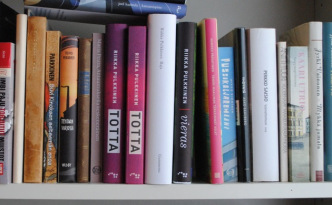 Translations of Finnish literature into English are booming, according to a new website set up by the Finnish-English Literature Translation Co-operative, or FELT.
Translations of Finnish literature into English are booming, according to a new website set up by the Finnish-English Literature Translation Co-operative, or FELT.
Or at least there is a tiny boom, as translator Lola Rogers puts it in her contribution to ‘Reflections’ on the FELT website.
Whereas less than 20 translations were published between 1992 and 2002, the number of translations published in the decade from 2002 was more than 34.The reason, according to FELT, is the new availability of qualified literary translators, whom the new website has been created to represent; each of them (David Hackston, Emily Jeremiah, Kristian London, Lola Rogers, Owen Witesman) now have two or more published Finnish works of fiction under their belts.
A significant factor has been the training events organised by FILI, Finnish Literature Exchange, publisher of this magazine – and, we might dare to say, Books from Finland itself, which offers translators a forum (as well as payment) for translations of extracts from interesting or significant new work.
The FELT website is worth a visit by anyone with an interest in Finnish literature – or translation. As well as details of published and forthcoming work, there is a collection of essays on the art of translating particular works, from Kristina Carlson (also ex-Editor-in-Chief of Books from Finland) to the novelist Asko Sahlberg and the modernist poet Eeva-Liisa Manner.
About us
8 January 2009 |
The Books from Finland online journal ceased operation on 1 July 2015, and no new articles will be published on the site.
A comprehensive online archive is available for readers to access. Brief extracts from Books from Finland may be quoted, provided that the source is cited.
If you wish to use longer extracts, please contact .

Books from Finland, an independent English-language literary journal, was aimed at readers interested in Finnish literature and culture. Its online archive constitutes a wide-ranging collection of Finnish writing in English: over 550 short pieces and extracts from longer works by Finnish authors were published from 1967 onwards.
Books from Finland featured classics as well as new writing, fiction and non-fiction, and other materials aimed at giving readers additional information on Finnish society and the wellsprings of Finnish literature. The target audience encompasses literary and publishing professionals, editors, journalists, translators, researchers, students, universities, Finns living abroad and everyone else with an interest in Finland and its literature.
Of course, publishing Finnish and Finland-Swedish literature in English requires skilled translators. Books from Finland’s editorial policy was always to use native English-speaking translators. In recent years David Hackston, Hildi Hawkins, Emily & Fleur Jeremiah, David McDuff, Lola Rogers, Neil Smith, Jill Timbers, Ruth Urbom and Owen Witesman translated for us.
Books from Finland was founded in 1967 and appeared in print format up to the end of 2008. From 2009 to 2015 it was an online publication. The journal’s archives have been fully digitised, and remaining issues will be made available in late 2015.
The Finnish Book Publishers’ Association (Suomen Kustannusyhdistys, SKY) began publishing the print edition of Books from Finland in 1967 with grant support from the Finnish Ministry of Education and Culture. In 1974 the Finnish Library Association (Suomen Kirjastoseura) took over as publisher until 1976, when it was succeeded by the Helsinki University Library, which remained as the journal’s publisher for the next 26 years. In 2003 publishing duties were handed over to the Finnish Literature Society (Suomalaisen Kirjallisuuden Seura, SKS) and its FILI division, which remained its home until 2015. The journal received financial assistance from the Finnish Ministry of Education and Culture throughout its 48 years of existence.
The editors-in-chief of Books from Finland were Prof. Kai Laitinen (1976–1989), journalist and critic Erkka Lehtola (1990–1995), author Jyrki Kiiskinen (1996–2000), author and journalist Kristina Carlson (2002–2006), and journalist and critic Soila Lehtonen (2007–2014), who had previously been deputy editor. The journal was designed by artist and graphic designer Erik Bruun from 1976 to 1989 and thereafter by a series of graphic designers: Ilkka Kärkkäinen (1990–1997), Jorma Hinkka (1998–2006) and Timo Numminen (2007–2008).
In 1976 Marja-Leena Rautalin, the director of the Finnish Literature Information Centre (now known as FILI), became deputy editor of Books from Finland. She was succeeded by Anna Kuismin (neé Makkonen), a literary scholar. Soila Lehtonen served as deputy editor from 1983 to 2006. Hildi Hawkins, who had been translating texts for the journal since the early 1980s, held the post of London editor from 1992 until 2015.
The editorial board of Books from Finland was chaired from 1976 to 2002 by chief librarian Esko Häkli, from 2004 to 2005 by the Secretaries-General the Finnish Literature Society, Jussi Nuorteva and Tuomas M.S. Lehtonen, and from 2006 to 2015 by Iris Schwanck, director of FILI. Members of the board included literary scholars, journalists, authors and publishers.
This history of Books from Finland was compiled by Soila Lehtonen, who served as the journal’s deputy editor from 1983 to 2006 and editor-in-chief from 2007 to 2014. English translation by Ruth Urbom.
The Canada goose
31 December 2008 | Archives online, Fiction, Prose
A short story from Tapaus Sidoroff (‘The Sidoroff case’, WSOY, 2008). Introduction by Kristina Carlson
It was no use even trying the old cart track branching from the main road. I turned off the engine and glanced into the back seat. My aunt lifted the brim of her hat, her bright eyes peering at me questioningly.
‘We can’t get any farther by car. The road’s nothing but rough brush. What do you think, Aunt Alli, can you walk the rest of the way?’
My aunt shook her head and didn’t even bother to answer. She opened the car door and clambered out. A swarm of black flies wafted into the air from the brush at the bottom of the ditch.
‘For heaven’s sakes, there’s sure enough of these flies.’
She fanned at the air with her hat, straightened the hem of her dress and trudged across the ditch, without looking back, through the thicket of willows. In spite of her hip trouble, the old woman made her way in such a hurry that I had my work cut out keeping up with her. More…
Finlandia Prize for Fiction 2011
1 December 2011 | In the news
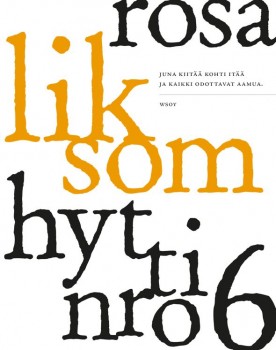 The winner of the Finlandia Prize for Fiction 2011, worth €30,000, is Rosa Liksom, for her novel Hytti no 6 (‘Compartment number 6’, WSOY): read translated extracts and an introduction of the author here on this page.
The winner of the Finlandia Prize for Fiction 2011, worth €30,000, is Rosa Liksom, for her novel Hytti no 6 (‘Compartment number 6’, WSOY): read translated extracts and an introduction of the author here on this page.
The prize was awarded on 1 December. The winner was selected by the theatre manager Pekka Milonoff from a shortlist of six.
‘Hytti nro 6 is an extraordinarily compact, poetic and multilayered description of a train journey through Russia. The main character, a girl, leaves Moscow for Siberia, sharing a compartment with a vodka-swilling murderer who tells hair-raising stories about his own life and about the ways of his country. – Liksom is a master of controlled exaggeration. With a couple of carefully chosen brushstrokes, a mini-story, she is able to conjure up an entire human destiny,’ Milonoff commented.
Author and artist Rosa Liksom (alias Anni Ylävaara, born 1958), has since 1985 written novels, short stories, children’s book, comics and plays. Her books have been translated into 16 languages.
Appointed by the Finnish Book Foundation, the prize jury (journalist and critic Hannu Marttila, journalist Tuula Ketonen and translator Kristiina Rikman) shortlisted the following novels: Kallorumpu (‘Skull drum’, Teos) by Eeva-Kaarina Aronen, William N. Päiväkirja (‘William N. Diary’, Otava) by Kristina Carlson, Huorasatu (‘Whore tale’, Into) by Laura Gustafsson, Minä, Katariina (‘I, Catherine’, Otava) by Laila Hirvisaari, and Isänmaan tähden (‘For fatherland’s sake’, first novel; Teos) by Jenni Linturi.
Rosa Liksom travelled a great deal in the Soviet Union in the 1980s. She said she hopes that literature, too, could play a role in promoting co-operation between people, cultures and nations: ‘For the time being there is no chance of some of us being able to live on a different planet.’
Midwinter in a minor key
23 December 2009 | Letter from the Editors
Finland’s end-of-year celebrations, both Christmas and New Year, take place in a thoroughly muted mode. At noon on Christmas Eve the Christmas Peace is rung out from the mediaeval cathedral in Turku, with the pious and seldom realised hope that peace and harmony will be unbroken for the following twelve days.
It’s true, though, that there’s little of the carousing that characterises Christmas celebrations further south; by and large, people stay behind closed doors, and there’s plenty of time, in the dark mornings and evenings and the brief twilight between them, to eat and drink and sleep – and, for those whose souls are not entirely claimed by the television and food-induced torpor, to read. More…

